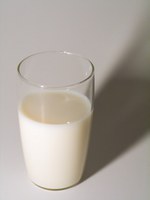Prairie Fare: Take a Milk Break
(Click the image below to view a high-resolution image that can be downloaded)
By Julie Garden-Robinson, Food and Nutrition Specialist
NDSU Extension Service
I recall an interesting conversation I had with my son and his buddy when I offered them freshly baked cookies. Both boys were 8 years old at the time.
I placed some warm chocolate chip cookies on a plate and poured each of them a glass of ice cold milk. My son’s friend looked at me as though I was suggesting he drink dishwater.
“I don’t drink milk,” he announced.
I slipped on my imaginary dietitian hat and asked, “Why not?”
Maybe he has a milk allergy, I thought to myself. Maybe his reason wasn’t my business, but the question and the glass of milk were now on the table.
“I just don’t like it. Anyway, orange juice is just as healthy. My mom said so,” he responded.
I now was stepping in forbidden territory: defying another mom’s recommendations.
I proceeded carefully by saying that his mom was right that orange juice might have added calcium and it provides vitamin C. I mentioned that milk would help him grow tall like his dad because it has nine nutrients, including protein, calcium and vitamin D.
I knew he was nearing the preteen and teen years when he would be experiencing a growth spurt. Children ages 9 to 18 have the highest calcium needs, at 1,300 milligrams per day. One study showed that just 12 percent of girls and 17 percent of boys met the calcium recommendations.
I could have mentioned milk also provides potassium, phosphorus, vitamins A, B12, riboflavin and niacin. Maybe I needed to put on a cow suit and do a little song and dance number about calcium.
However, that might have made the kid run out our front door.
Taste drives most dining decisions, so I tried something else.
“Do warm chocolate chip cookies taste better with orange juice or milk? We could do a taste test,” I said.
My son’s friend wasn’t impressed or swayed by my comments. He wanted orange juice.
My son rolled his eyes at me, grabbed another cookie and poured himself another glass of milk. I poured his friend a glass of juice and put my dietitian hat away for the day.
My son was doing his part of positive role modeling anyway.
I might have done better by reaching out to his mom to encourage her to pour a glass of milk for herself more often. A child may not always do exactly what his or her mom or dad says, but the kids watch what you are doing. Researchers have reported that a mother’s food preferences can affect a child’s food preferences.
Skipping milk shows its effects sooner than one might anticipate. Children who skip milk usually have lower overall calcium intake, are shorter, have smaller bones and lower bone density, according to published research.
People vary in their calcium needs, and many foods are fortified with calcium. However, few foods are as complete a nutrition package as dairy foods. Current nutrition recommendations set the goal at three servings of dairy or an equivalent amount of calcium per day.
Looking back at my son’s fruit juice-loving friend, perhaps I should have offered some flavoring for his milk. Yes, the flavoring adds some calories but the calcium and other nutrient content remain the same. He might actually have accepted the fruit-flavored milk.
Here’s a tasty shake from http://www.dairymakessense.com to take on the go. With 15 grams of protein and 3 grams of fiber, this breakfast in a cup will tame your appetite.
Peanut Butter and Banana Breakfast Shake
1 c. fat-free or 1 percent milk
1/2 c. frozen banana slices
1 Tbsp. creamy peanut butter
1/2 tsp. vanilla extract
1/4 tsp. ground cinnamon
Combine all ingredients in a blender; blend until smooth and creamy. Serve in a tall glass or on-the-go drink container.
Makes one serving with 270 calories, 9 grams (g) of fat, 35 g of carbohydrate, 15 g of protein, 3 g of fiber, 220 milligrams of sodium and 35 percent of the daily value for calcium.
(Julie Garden-Robinson, Ph.D., R.D., L.R.D., is a North Dakota State University Extension Service food and nutrition specialist and professor in the Department of Health, Nutrition and Exercise Sciences.)
NDSU Agriculture Communication – March 6, 2014
| Source: | Julie Garden-Robinson, (701) 231-7187, julie.garden-robinson@ndsu.edu |
|---|---|
| Editor: | Rich Mattern, (701) 231-6136, richard.mattern@ndsu.edu |


